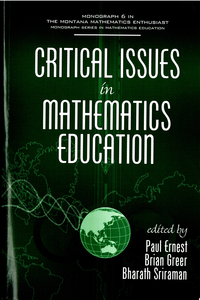Whose mathematics education? Mathematical discourses as cultural matricide?
Walls, Fiona (2009) Whose mathematics education? Mathematical discourses as cultural matricide? In: Ernest, Paul, Greer, Brian, and Sriraman, Bharath, (eds.) Critical Issues in Mathematics Education. The Montana Mathematics Enthusiast: monograph series in mathematics education, 6 . Information Age Publishing, pp. 45-52.
![[img]](https://researchonline.jcu.edu.au/11335/2.hassmallThumbnailVersion/11335_Walls_2009_front_cover.jpg)
|
Image (JPEG) (cover)
Download (4MB) |
|
|
PDF
Restricted to Repository staff only |
Abstract
“Mathematics education, for what and why,” begs an additional question: “Whose mathematics education?” Among the ideas for discussion in this group is the concern that “school mathematics has scant relevance to the personal and collective lives of the students or the adults they will become.” This paper takes a step beyond “reactions against Eurocentric narratives of the history of mathematics” to the question of the sexualization of mathematical discourses (Irigaray, 2002), including notions of mathematical literacy. Within such discourses, women appear only by virtue of their invisibility.
A globally recognised phenomenon in mathematics education is the differing ways in which boys and girls participate and achieve in their learning of mathematics. According to the recently publicised research of Guiso, Monte, Sapienza and Zingales (2008) based on the PISA analysis, the “gender gap,” long perceived to exist between girls and boys in mathematics, disappears in societies that treat both sexes equally and men and women have access to similar resources and opportunities, suggesting that boys are not innately better at mathematics than girls, and any difference in test scores is due to nurture rather than nature. When girls have equal access to education and other opportunities they do just as well as boys in mathematics tests.
| Item ID: | 11335 |
|---|---|
| Item Type: | Book Chapter (Research - B1) |
| ISBN: | 978-1-60752-039-9 |
| Keywords: | mathematics education, sociology of education, subjectivity, gender in education |
| Additional Information: | This publication does not have an abstract. The first two paragraphs of this chapter are displayed as the abstract. |
| Date Deposited: | 24 May 2010 22:53 |
| FoR Codes: | 13 EDUCATION > 1303 Specialist Studies in Education > 130308 Gender, Sexuality and Education @ 30% 13 EDUCATION > 1302 Curriculum and Pedagogy > 130208 Mathematics and Numeracy Curriculum and Pedagogy @ 40% 16 STUDIES IN HUMAN SOCIETY > 1608 Sociology > 160809 Sociology of Education @ 30% |
| SEO Codes: | 93 EDUCATION AND TRAINING > 9301 Learner and Learning > 930102 Learner and Learning Processes @ 50% 93 EDUCATION AND TRAINING > 9302 Teaching and Instruction > 930203 Teaching and Instruction Technologies @ 50% |
| Downloads: |
Total: 342 Last 12 Months: 4 |
| More Statistics |



